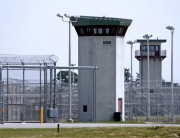It's no great secret that when a person is arrested they'll be fingerprinted as part of the booking process; in the past decade, many California jails have also started to take a DNA swab.
The idea behind that was simple: cross check the defendants DNA against a national database to determine whether their genetic fingerprinted tied them to a prior crime. In some cases, the practice has helped law enforcement officials solve years-old cold cases.
But the practice may have found itself coming to a screeching halt. Last week, a CA Court of Appeals found that taking a DNA sample from someone who has been charged with, but not convicted of a crime, violates their constitutional rights.
Since that time, the Orange County Jail has pulled the plug on collecting samples because jailers would rather err on the side of caution until the legal battle is done. If the final ruling finds the practice is illegal, all prior collected DNA samples would need to be destroyed.
The law that started it all
The year was 2004.
Back then, a group of impassioned individuals gathered enough signatures to get the mandated DNA sample idea onto the November ballot. The idea was to collect as many samples as possible in hopes of whittling down Orange County's unsolved case log.
The California DNA bank has since been linked to the one the FBI has, and contains more than 11 million DNA profiles.
This year alone, the bank has helped tie offenders to as many as 300 unsolved OC crimes, sources said. Although the county hasn't said how many of the cold cases have been closed as a result of the hits, they have said its helping.
The appeal
The practice continued for years, until a San Francisco defendant challenged it after he refused to let jailers swab his cheek after he had been arrested on suspicion of a crime.
The appeals court ruled 3-0 that the practice violated the plaintiff's expectations of privacy. It was also flagrantly invasive to people who had been formally charged or convicted of a crime.
Orange County officials say that even if they do need to permanently stop DNA collection, they may be able to hold onto some of their samples. If very, very low-level defendants gave permission for the jail to take their DNA in exchange for having their charges dropped, those profiles are in the clear.
But for now, continued collection has been stopped until the courts get all this worked out.
















Follow Us
Facebook
Twitter
Google +1
LinkedIn
Youtube